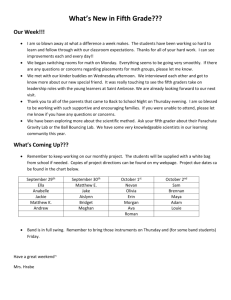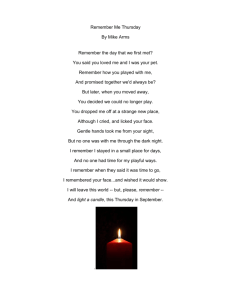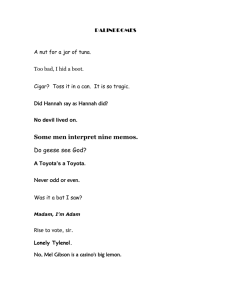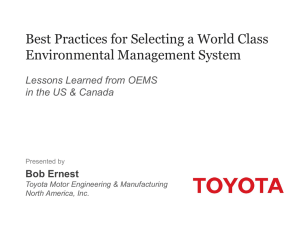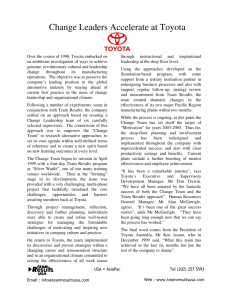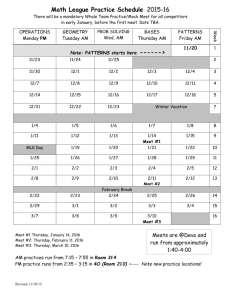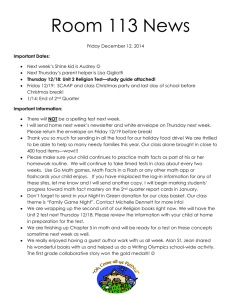Course Overview
advertisement
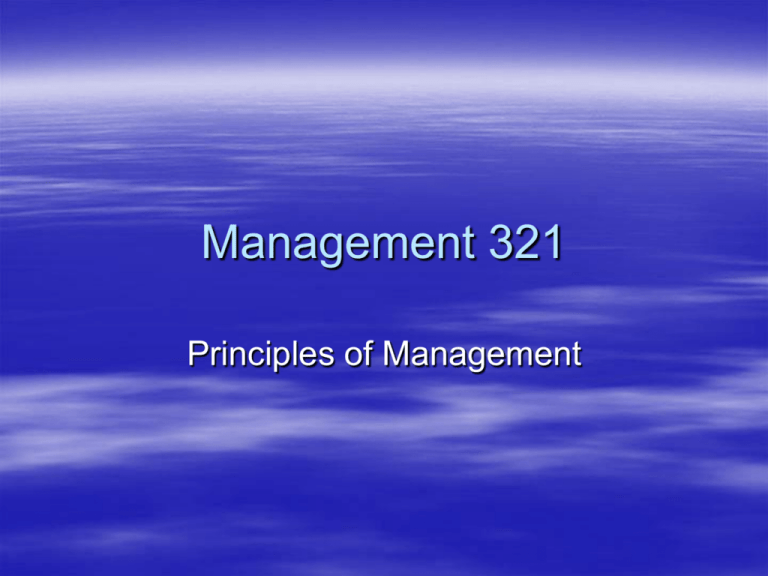
Management 321 Principles of Management Management 321 Survey of basic management principles and practices Tuesday and Thursday 8-9:15 am Thurmond 413 Instructor Jim Olson, Executive in Residence Thurmond 126 Phone: 323-2466 olsonj@winthrop.edu jimcashiers@aol.com Office hours: Tuesday and Thursday 9:30-11:30 am or by appointment Always welcome, but don’t waste your breath and my time; know what you want and come prepared to get it. Who are you? Stand up and speak up > Name > Home town > Class (sophomore, junior, senior) > Major > Favorite activity Who am I? 1941: Born Cody, Wyoming Lower middle-class/upper-poor family 1960: Graduated from Mount Hermon (MA) prep school 1964: Graduated from Stanford University 1964 to 1968: Active duty with the U.S. Navy – Viet Nam and San Francisco 1969: Master’s degree from Northwestern University 35 years in the North American auto industry – 16 at Ford 19 at Toyota. Final position: senior vice president of Toyota Motor North America in New York City; retired 6/1/04 Oversaw Toyota’s government relations, public relations, stockholder relations, corporate contributions, the Toyota-USA Foundation, corporate advertising and motorsports; was a member of Toyota’s 12man North American executive committee Married with one son (getting his Master’s here at Winthrop) Hobbies: gardening, golf, reading, cooking, teaching, collecting “sparklies” Parkinson’s Disease I have Parkinson’s disease Don’t be distracted by symptoms Two Required Textbooks Contemporary Management by G. R. Jones and J. M. George (fifth edition) The Little Red Box of Management Tools by Jim Olson Recommended for Project The Omnivore’s Dilemma Michael Pollan Great by Choice Jim Collins and Morten T. Hansen The Declaration of Independence The Bill of Rights The Founders What Am I? Introverted obsessive-compulsive, perfectionist Therefore, I hate to have any student fail my course. I will do everything I can to help you get a passing grade, but you must earn it. What I Expect From You Will use some homework, four tests, lecture and STORIES. Lecturing only partly effective, so will ask questions - a two-way learning process requiring your participation “Managers In Training” – active learner Be on time, awake, attentive, prepared Dress neatly, act professionally What Are Our Goals? Two goals: To familiarize you with the principles and practices of management: Planning, organizing, leading, controlling and using money, manpower, material, morality and information (the five business inputs) to achieve organizational goals efficiently and effectively Goals? To teach you how to use the principles to manage well, to evade business threats, and to exploit business opportunities. This goal requires you to use critical thinking. CRITICAL WHAT? Critical What? Critical Thinking: Rigorously analyzing, evaluating and combining information continuously gathered through observation, insight and reflection to draw conclusions that form a foundation for action Critical Thinking Many of the “beliefs” upon which we take action are unexamined and untested. One of my professors called them MURK – Mostly Unexamined Received Knowledge. Critical thinking -- the central skill of good management -- examines information from multiple sources before conclusions are drawn, beliefs formed and action taken. What I expect (hope for) Inform me in advance if you must miss a class. Miss seven classes and you will be out. Read, consider and be prepared to discuss the material in each chapter and any supplemental materials during the class in which presented. Professional Behavior Papers should be computer-generated, not handwritten. Submit them to me at both computers (office and home) as a file attached to or incorporated into an e-mail. That way I can correct your work electronically and return it to you more quickly. Submit on time – one letter grade down for each three days late. Cheating of any kind not worth potential consequences; zero-tolerance policy. Professional Behavior “RESPECT” Respect your sources; no plagiarism Respect your colleagues; all comments welcome; only dumb question is the one you don’t ask. Respect your obligations by doing team assignments on time; no free riding. Your team mates will review and grade your performance for me. Respect common courtesy; no cell phones or pagers during class. If pending emergency, give it to me and I’ll monitor. Class Web Site All lecture power points will be available before the class in which they are presented on the course website: http://faculty.winthrop.edu/olsonj Students With Disabilities Gena Smith on 323-3290 – form to me outlining any special requirements Office Hours As noted earlier, my office is in Thurmond 126. Office hours: Tuesday and Thursday 9:30 to 11:30 am If above hours don’t work, please contact me via e-mail or face-to-face and we’ll find a mutually convenient time; prepare! Team Project I will assign teams. Semester-long project – see schedule in syllabus for team presentation days at end of term. Subject: Using course principles, explain: > How General Motors went wrong > Was it wise for the government to bail out GM? > Will GM succeed over the long term? > How you would try to return GM to fully competitive condition if you were in charge. Team Project Background package will be provided, but you will need much more current information to become current on the situation Grade will be based on quantity and quality of research, power point quality and clarity, persuasiveness of insights/recommendations, linkage to course principles, presentation skills, and team-skill ratings from your fellow team members. Each team member must share in a power point presentation of no more than 20 minutes Begin research right away! Journal Project Keep a journal about this course, what you are experiencing and learning at Winthrop, future career plans, any relevant subject. Suggest you write for at least 15 minutes once a week. Must be computer-generated. Submit to me via e-mail when I ask for it. Grade based on honesty, self-insight, quality of writing. Grading Policy A extraordinary and significantly beyond requirements B+ almost… B above-average and exceeding requirements C+ almost… C average and meeting requirements D below-average but with some promise F inadequate and not meeting requirements Grading Policy Three Interim Exams: Final Exam: Team Project: Journal: Homework, participation, showing up: 30% 25% 25% 10% 10% Extra Credit Questions Two-track Approach At the end of each of the three sectional examinations, there will be a few questions drawn from any supplemental material I hand out or the recommended material mentioned in the syllabus. Those of you with enough energy and curiosity to read and think about this extra material can gain extra credit by correctly answering them. Failing to answer them will not penalize those too busy (or too lazy) to take advantage of this opportunity. Pre-Exam Reviews Notice in the tentative schedule attached to the printed course syllabus that there will be a classroom review before each exam. Don’t miss these sessions because they provide a huge advantage! What You Should Get From This Course The evolution of management theory is not the most important subject in this course. Nor are the many matters addressed in the other chapters. What I really want you to take away is a practical toolbox of ideas and examples of how to manage so that – after graduation -- you won’t freeze like a deer in headlights when you have to do it. Because it is where I received my best training and experience, much of this practical stuff will come from Toyota and the rest of the auto industry. I apologize in advance for using the “I” work so much and talking so often about the fascinating business I was so long a part of. But I’m not an academic, armchair expert, I actually did this stuff, so my lectures are very personal narratives. Management Easy to Understand Hard to Do We will discuss effectiveness, efficiency, innovation, discipline, strategy, the competitive power of money, zero-based budgeting, kaizen, nemawashi, genchi genbutsu, PDCA, BHAGs, KPIs, TGW versus TGR, and sustainable competitive advantage – among other business concepts and practices. Management… Many of these are not in the primary text, but rather in my book or from my personal experience. All are meant to convey a practical “toolbox” approach. In this respect, this course is significantly different from the other sections of MGMT 321. Think of yourself as either blessed or cursed. The Fifth Element MORALITY Morality is the fifth business input not mentioned in any other definition of management I’ve seen. It is vital because business requires a transaction, which cannot happen without trust, which can’t exist without morality. What is Business Energy and insight… Smarts and stamina… Discipline and integrity… Courage and commitment… Dreaming and doing and creating the value that is the foundation of the American lifestyle! Final Lesson “The most valuable lesson I can teach you is to become your own teacher.” Socrates People who don’t learn don’t thrive. Companies that don’t learn don’t survive. Nine days from now... (That’s Thursday, January 19) Bring me this… HOMEWORK #2 AVERAGE HUMAN HOURS According to an article I read, the average American man now lives to the age of 73. The average American woman lives to more than 79. For the man, that’s about 639,000 hours. For the woman, about 692,000. The average student in this class already has used up about 184,000 hours. What will you do to maximize the value of your remaining 455,000 to 508,000 hours? Homework #2 Possible Content Who am I? – Where born? – Where been? – What do my parents do? – Do they pay my way or am I already my own? – Significant job experience to date? – Significant skills (What are you good at?), hobbies and outside interests? – What do I most like to do? Homework #2 Where am I going? How will I spend my remaining hours of life? – Graduate school? What subject? – If job, what would you most like to do? – Where (preferred industry, company, geographical area)? – What do you think is most important about selecting an employer? What should you look for in a company? What do you think they will look for in you? – Most important career goal? – MOST IMPORTANT LIFE GOAL? – What do you want people to say about you at your funeral? Homework #2 What else do you want to add? Be creative, but think and write clearly. Respect the power of language by choosing your words carefully. Not the “nearly right” word, but the “exactly right” word. PROOFREAD! I know you’re busy, but please take time to show me your best capability. No more than two single-spaced, computer-generated pages because brevity forces selectivity, enhancing clarity. Less always is best! Submit via e-mail. Due Thursday, September 1 – nine days from today. Homework #1 Next time (this Thursday, January 12) bring me this: No more than one page What do the Salamanca Scholastics have to do with Capitalism? Hint: “Leave us be!” SIT STILL! Not Done Yet A baseline quiz designed to give me some idea of what’s in your collective head. Five minutes. DO NOT SIGN YOUR NAME.
